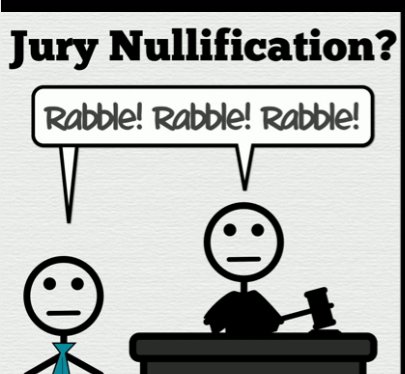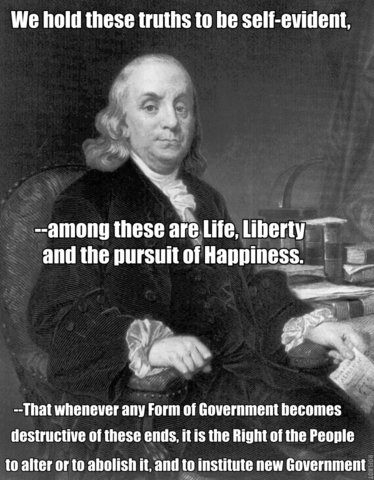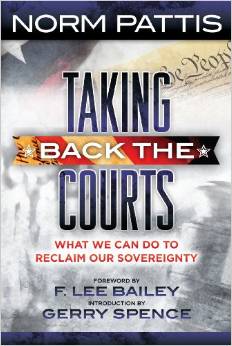|
By Norm Pattis:
There is no such thing as justice inside or out of the court. We say of the the state that it has a monopoly on the legitimate use of force. We say that authority is is exercised in our name of We The People. The Preamble of the U.S. Constitution begins with these words. Our Bill Of Rights guarantees us rights that the government is not supposed to be able to trample upon. Judges put their shoes on the same way you do; they only choose to dress funny to create a sense of distance between themselves and all others in the courtroom. A judge is entitled to as much respect as anyone else, but no more respect. When the judge enters the courtroom, the marshal will order you to stand, ask him, "Why? What law requires this?" He will not be able to recite such a law because these is none. But odds are that he will ask you to leave the court. Indeed the judge may order you to do so. Ask "Why?, again. You have the First Amendment right to court proceedings; no legal duty requires you to stand when the judge enters. If this first symbolic step were taken in every courtroom throughout the country, it would be as symbolic a gesture as dumping tea in Boston Harbor. Do you care enough about your liberty to take this small step? You must irreverenty question the pronouncements of judges who pound their judicial breasts like drummers on soggy drums. [ This order by the marshal to stand up when the judge enters shows the obvious disregard of the law and the U.S Constitution by our Framingham District Court judges, our Middlesex DA (Marian Ryan and her corrupt minions) and the defense lawyers. There is also no legal requirement to prevent you from reading a book in court while you wait your turn in the proceedings. ] Lawyers are required to respect the institution of the court despite that in the hands of unfettered and ignorant power it produces pain and injustice that would occasion any honest person to rise up in loathing and horror. A group of people marching lockstep is quickly hypnotized by the cadence of uniformity. A government unchallenged by those it governs becomes arrogant and haughty. The courts belong to us, the people.
The courts belong to the people. There has been a silent revolution by judicial activists posturing as jurists concerned with keeping judges from wielding too much power. Their weapon of choice has been a doctrine of qualified immunity. This judicially created fiction has slammed shut the nation's courthouse doors to ordinary people seeking to hold government actors accountable.

The police claim the benefit of something called sovereign immunity. It is an ancient legal doctrine applicable to kings and emperors; it has no place in our republic. It is a doctrine derived from the premise the king can do no wrong that does not deserve a place in American law. The United States was founded on the rejection of monarch and royal prerogative. American government is based on the fundamental recognition that the government and government officials can do wrong and must be held accountable. Sovereign immunity undermines that basic notion. Immunities aren't all that difficult to grasp. If the law is a vast set of rules defining what we can and cannot accomplish in a court of law, immunity is simply a device by which a judge declares a person off limits. You can read the U.S. Constitution 150 times until your eyes fall out or until the paper it is written on disintegrates, but you will not see the term sovereign immunity. A known-narcotic area is a law-enforcement euphenism for almost any urban location in which young men of color congregate. [This is bullshit]. Fleeing from police, in law enforcement parlance is what is known as a conscious of guilt, meaning that only guilty people flee. [This is bullshit]. All Americans should have the right to counsel at government expense when the government charges them with a crime. We should have a universal public defender system, one to which all Americans can turn to counsel when they are accused. Prosecutors have virtually unlimited discretion to bring charges and they are armed with staffs that include not just investigators, but experts from forensics labs and the efforts of law enforcement at the local, state and national level. Very few defendants faced with this arsenal are as well equipped. A universal public defender system does not mean conscripting all members of the bar and making them government employees. It means that all members of the bar can apply to be included on a list of qualified defenders. It also means that making your way onto that list and remaining there, requires demonstrating minimal competence in the difficult work of defending the accused. It is very expensive to provide an adequate defense to a criminal case. When the government charges a person with a crime, the work of police officers, prosecutors, experts and investigators are all borne by taxpayers. The full weight of the government, with it's almost magical ability to finance just about anything by means of taxation, is brought to bear against an individual. Who can match the government's spendng and resources in defending a crime? The only way to rein in an aggressive government is to require it to bear the costs of the fights it picks. The government should be required to calculate the unit cost of each prosecution: what does it cost to bring an action? And we speak here of both the prosecution and defense. At the very least, when the government loses at a criminal trial, it ought to be required to reimburse the defendant for the cost of defense. Otherwise, we make a mockery of the presumption of innocence. What we need is a universal public defender system. In plain English, each and every person accused of a crime should have court appointed counsel with the same resources as the prosecutorial side.
Taxpayers fund each prosecution no matter how grave or frivolous.
Why not create a system that funds both prosecution and defense equally.
The use of bogus expert testimony is a significant problem in the criminal courts. A recent study by the National Academy of Sciences laid waste to the use of forensic sciences in the courts. There is no such thing as forensic science. There are core sciences and applied sciences. These techniques and methods of investigating things yield results that are more or less reliable. Calling something forensic merely means it has been prepared in anticipation of a court proceeding. Scientific and medical assessment conducted in forensic investigations should be independent of law enforcement efforts either to prosecute suspects or even to determine whether a criminal act has indeed been committed. [ In Massachusetts, the crime lab is funded by and under the control of the state police. Would you expect fair results?] More than once, we have heard a prosecutor in trial court urge a judge to admit contested evidence: The state cannot prove its case without this evidence, your honor. So what? The rules of evidence require reliable evidence. The trial deck is not supposed to be stacked in favor of conviction.
Circumstantial evidence is evidence of things seen, permitting an
inference about things unseen.
The courts are quick to admit questionable scientific evidence because the state could not prove many of its cases without junk science. In other words we sacrifice the presumption of innocence on the altar of something akin to scientific voodoo. Only stones are unmoved by the sight of another's suffering. Every heart is inspired to act in the face of life's great tragedies. A deep-seated hope harbored by all is that of an orderly universe. We want things to happen for a reason. When things occur that inspire pity or horror, we want to restore the hoped for balance. That requires righting what was done wrong. In criminal courts, that means assigning blame. Thus, when a child dies, there must be a culprit. In a secular age, we prefer a defendant, as many of us have long since retired the Devil as an effacacious moral agent. Each of us can be prosecuted on a whim; all of us are criminals when viewed through lenses tinted just so.
There is no mob quite so dangerous as a self-righteous mob.
Consider the business of recruiting witnesses, another pastime of ambitous federal prosecutors. The feds call these witnesses cooperators, or concerned citizens. The defense bar calls them snitches or rats. The concept of Grand Jury secrecy is really little more than self-righteous judicial swill. As a general rule, and with few exceptions, it is wise to plead the Fifth Amendment whenever the government comes calling. There is no telling how your words will be used against you. The government gets to lie, bob, weave, and engage in all manners of deception. Yet, if we do likewise we go to prison. Did We The People consent to be governed by a caste of professional liars? 42 USC Section 1983 Peremptory challenge in law refers to a right in jury selection for the attorneys to reject a certain number of potential jurors without stating a reason. Other potential jurors may be challenged for cause, i.e., by giving a good reason why they might be unable to reach a fair verdict, but the challenge will be considered by the presiding judge and may be denied. There exists a vast gap between the rhetoric and the reality of American life. For many, that gulf is cast in racial hues; for others the chasm is purely economic. But for all there is lingering sense that there is something askew in a nation that promises equality for all and then denies so much to so many. United States v. Comstock, 560 U.S. 126 (2010), was a decision by the Supreme Court of the United States, which held that the federal government has authority under the Necessary and Proper Clause to require the civil commitment of individuals already in Federal custody. The practice, introduced by the Adam Walsh Child Protection and Safety Act, was upheld against a challenge that it fell outside the enumerated powers granted to Congress by the Constitution. The decision did not rule on any other aspect of the law's constitutionality, because only the particular issue of Congressional authority was properly before the Court. The federal government is supposed to have limited powers. That was the framers intent. Those powers not expressedly given to the federal government were retained either by the people or the individual states. The Court justifies this sweeping new federal power as little more than business as usual. This power is simply a power necessary and proper under Article I, Section 8 of the federal Constitution. When it comes to claims of child sex, we've abandoned reason. Consider the following claim: the majority of those accused of possessing child pornography have actually abused children. This is simple silliness and plain stupidity from the National Center for Missing and Exploited Children (NCMEC). It is merely an assertion without eivdence. Something like gods. According to Ernie Allen, president of NCMEC, real children are harmed in the production of these images and these same children are harmed every time these images are downloaded and viewed. He presumably gets paid a decent sum for uttering this specious idiocy. Children are not harmed anew, when in some basement, thousand of miles away, some man sneaks a peek at the images. Things are spiraling out of control in child pornography cases. The number of such cases are skyrocketing. If you have not seen the film Reefer Madness, check it out. It's a 1936 film about the dangers of smoking marijuana. Marijuana, you see is the gateway drug of the masses. Start with weed, and end up choking on the more serious drugs. The decent into madness starts with but a single puff. The line between fact and fear is easily blurred. The single most important criminal justice reform within reach in each statehouse is the elimination of mandatory minimum prison sentences and its consequences. The ends of justice require it. Sound economics counsel it. Romeo ought not to be required to register as a sex offender. There will come a time, in sexual consent cases, in which our incredulity about the words of children will look as troubling as the manner in which we treated accused witches in Salem, Massachusetts. In 1692, 19 men and women and two dogs were convicted and executed for consorting with the Devil. These deaths were the product of the words of children who claimed to have been seduced by a Satan worshipping household servant named Tituba. Now, the little crazy children are jangling the keys to the kingdom, and commom vengeance writes the law. [The case of Martha Coakley, Massachusetts District Attorney and Gerald Amirault exemplifies this.] Children do not deserve privileged status in our courts. Perhaps, it is time to reinvigorate the Mosaic "two witness" rule, once required in homicide cases, and apply it to child sex cases. In those cases in which liberty hangs solely on the word of a child, and in which there is no other witness or any physical proof of harm, it should simply be too risky to prosecute. We used to permit juries to nullify the law when they thought it was wrong, but the Supreme Court forbade the practice in federal courts; few states permit it.

It is far too easy for lawmakers to pass legislation with draconian sentences from within the antiseptic chambers of a legislative assembly. Every lawmaker should be required to spend three months in prison and two weeks in solitary confinement, to get a sense of what it is like to live isolated and afraid. Is it too much to ask those who make the product to test drive what they are producing. Do lawmakers have any idea what follows from conviction of a sex crime. How many of them are secretly guilty of the conduct they criminalize? Lawyers tell juries in virtually every civil case that they are not to be governed by passion, sympathy, or prejudice. They are presumed to follow this rule of law. This passion, sympathy and prejudice is dispensed with by prosecuting attorneys in their vicious prosecution of child pornography cases or child abuse cases. This rule of law is quickly dispensed with. There are three levels of federal courts. There are 94 district courts, 11 different appellate courts in 11 districts, and one Supreme Court. No lawmaker should be able to seek re-election to a third term unless he or she agrees to serve six months in a Supermax prison. The benefits of such a system should be obvious to everyone. Let the lawmakers taste the penal codes they are so quick to pass. Lawmakers churn out additions to the penal code annually. When they are not adding new offenses, they are extending the length of sentences for offenses already defined. A congressman or state legislator has great power to set the terms and conditions under which increasing numbers of Americans live. Indeed, the penal code is now so vast and complex that we are almost all criminals at least part of the time. When everyone breaks the law, the rule of law breaks down as prosecutors acquire the discretion to pick and choose whom they punish. Lawmakers tinker with the penal code without much comprehension of the real cost of what they are doing. The fact is that the American criminal justice system is savage. We imprison a greater percentage of our population than any other industrialized nation . And the sentences we impose for all manner of offenses are staggeringly long. We've transformed the penal system into a human waste management system. Rehabilitation has never been a goal of our prison system. The goal is to isolate and incapacitate. We should require lawmakers to live in the holes into which they consign so many Americans. It's not such an onerous suggestion. A lawmaker can walk away from power and its perquisites after a few terms. But if the hunger for power remains, then let power face the stark reality of what it can do to a man or woman; put the lawmaker away and deprive him of the liberty to hug his wife, kiss his child or dream the modest dream that console his constituents. Lawmakers fresh from a bid in a penitentiary will come to view a ten year sentence as plenty long and sufficient to punish most crimes. What does locking someone up actually accomplish? We need a trial lawyer with experience defending people on the Supreme Court. That should not really be asking too much. There are nine seats, after all. What would be the harm in placing someone on the Court who knows what it is like to face the government as an adversary. The law is simple; it is civilized society's way of brokering the peace in the face of conflicts rubbed raw by human need. The law is about broken dreams, passion recklessly spent, hope redeemed and the terror that comes of the confrontstion of the irrational with the claims of reason. Put an authority figure in a black robe on an elevated perch and set him loose on prospective panelists; most would be jurors are so intimidated they'd agree to just about anything the judge suggests with his questions. Voir dire Most judges have as much trial experience as a nun in a whore house. Every day, Americans look to the courts to address problems affecting their daily lives. An imperial judiciary. WikiLeaks spoke inconvenient truths to power. Assange exposed governments as liars striking at the theology of deceit. Government thrives on secrecy; it is the custodian and beneficiary of one of the grandest mysteries of humankind - the transformation of naked power used by one person over another into authority. This piece of social alchemy is what distinguishes a hoodlum's carjacking from the police seizure of an automobile. Authority is power plus the badges, indicia and symbolism of what we call legitimary. All power corrupts, and absolute power corrupts absolutely. If lawmakers mandate a mandatory minimum sentence, then a judge imposes it. The judge disclaims responsibility, taking the judicial version of the Nuremberg defense: he or she is, after all, just following orders. Prosecutors, too, turn away from the consequences of their acts. Legislators create the crimes and penalties; Prosecutors just move the widgets down justice's conveyor belt. In this way, government becomes unaccountable. Fully Informed Jury Association Juror's Handbook There are simply too many criminal laws. No one knows just how many criminal laws circumscibe the conduct. of any of us at the state and federal levels. Prosecutors have broad discretion to charge or not on a bewildering range of offenses. For far too many Americans, the criminal law is a foreign curse, a plague that falls upon them much like cancer and must be endured as a state-sanctioned illness. Over-criminallization breeds a crisis in legitimacy. Only white deaths must be avenged in public spectacle. Page 150
http://www.metrowestdailynews.com/article/20140829/OPINION/140826352/2014/OPINION Contempt is one of three leftover practices from British tyranny used to put people in jail without giving them the right to be judged by a jury of peers. The others are denial of bail and extradition to a state or country which itself does not guarantee trial by jury. The "contempt" charge can be manifested in one of several ways. A common way is when a person exerts their fifth amendment right not to testify, and the judge overrules it. This is what initially happened in Singleton's case. Another is when a person loses a civil case but fails to make the required monetary payments to the plaintiff. Yet a third, increasingly common in the Commonwealth, is when judges "decriminalize" criminal charges pursuant to power granted them in MGL Ch 277 Sec 70C . This little known statute allows a judge, with or without the defendant's consent, to "decriminalize" the charges a defendant is facing and fine him an amount not in excess of that called for in the criminal statute. Although the person is spared a criminal record, if he doesn't pay the fine, he is held in "contempt" and put in jail. |



Send comments to:
 hjw2001@gmail.com
hjw2001@gmail.com
|



